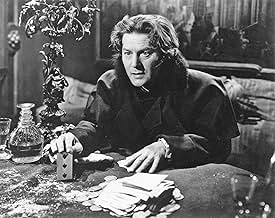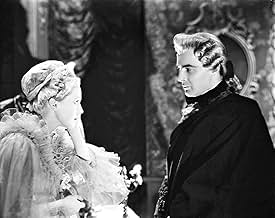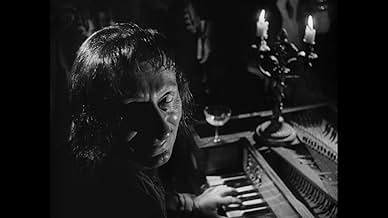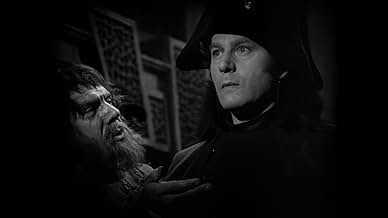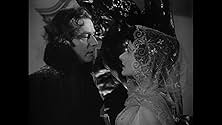Adicionar um enredo no seu idiomaAn army officer becomes obsessed with learning the secret to a card game for which an elderly countess sold her soul years earlier.An army officer becomes obsessed with learning the secret to a card game for which an elderly countess sold her soul years earlier.An army officer becomes obsessed with learning the secret to a card game for which an elderly countess sold her soul years earlier.
- Direção
- Roteiristas
- Artistas
- Indicado para 1 prêmio BAFTA
- 3 indicações no total
- Countess's Lover
- (as Yusef Ramart)
- Direção
- Roteiristas
- Elenco e equipe completos
- Produção, bilheteria e muito mais no IMDbPro
Avaliações em destaque
Anton Walbrook may have played more multi-dimensional characters in other films, but never with the same frightening intensity as in this one. The cast is uniformly excellent, but it's his performance as Hermann that really makes the film memorable. Hermann is a strange sort of cinematic hero with no redeeming characteristics whatsoever. His personality is dominated by four of the seven deadly sins: pride, envy, wrath, and greed. As for lust, he lusts only for power, money and influence, his declarations of love being completely false. Gluttony is not an issue, as he lives in poverty in order to horde what money he has. As for sloth, he exerts extraordinary effort into fulfilling his schemes, which are entirely self-serving. Sounds like a thoroughly unpleasant fellow. But Walbrook makes this brooding, scheming, petty, and utterly reprehensible nonentity with a Napoleon complex into a fascinating character study -- a real tour-de-force. The Vienna-born Walbrook (originally named Adolph Anton Wilhelm Wohlbrueck) exaggerates his Teutonic accent to Peter Lorre-like intensity, to great effect. It's this film that made him one of my all time favorite actors.
The look of this film is also extraordinary. Even in this pristine presentation, the cinematography is very dark and deeply shadowed. The shadowy look of the film, along with some oddly angular or distorted shots, is suggestive of expressionist style. The story is told very directly and the plot moved along efficiently, with no superfluous action, which adds to the unreal atmosphere of the piece. Everything associated with the story seems to take place in quick succession. In a city as huge as St. Petersburg, Hermann wanders from the spooky booksellers' shop directly to the old countess's house purely by chance. Every element of the story is essential, and executed with maximum effect and style. The funeral scene in particular is unforgettable.
What a pleasure to find that this terrific, but relatively obscure, film has finally gotten a DVD release, and looks better than I've ever seen it looking. Almost everyone who's commented on it cites the fact that it is little known, and maybe this new DVD will change that a bit.
Relatively poor Captain in the Royal Engineers jealous of the wealthy Cavalry officers around him dreams of making his fortune at faro, and eventually gets his way at the price of his precious soul. How he does it is a spooky tale involving an ancient irritating Countess played by the perfect Edith Evans and his attempt to get her to acquiesce to his demands. Who can forget the funeral scene when Walbrook is wondering how the dead can give up their secrets! Everyone acted their hearts out, Ronald Howard nicely restrained to Walbrook's occasional lapses into melodrama. Auric's music is spot on and as graceful as ever, we even get a preview of Orpheus in here to which he composed the music for the following year. The game of faro as depicted here always struck me as particularly boring, but I suppose it was as good a way as any for someone to lose money fast. The secret of winning money at cards is not to play for money at all and to keep your money. I simply can't understand why anyone would watch this for the full 90 minutes hating almost every minute and then waste more of their time telling us!
An utterly marvellous film, a UK post-War Wonder which will survive all comments positive and negative.
This lavish, spooky and slow burning telling of Pushkin's short story is filmed in dark, shadowy rooms rather like one of Universal's gothic horror films of the thirties. Walbrook is excellent as the desperate, almost maniacally obsessed man out to find the great life secret and Evans is on top form as the grumpy, intolerable countess who has lost her soul. Where the film particularly excels is in the last 30 minutes where there are a number of genuinely chilling supernatural scenes as a ghost haunts Walbrook leading up to a climactic card game, where having learned the secret, he risks all. Spooky and unique in its way - there are no other films that I can recall that are like this.
The story is based on Alexander Puschkin's novella, "The Queen of Spades (1834), about a young captain in the Russian army (Anton Walbrook), an outsider (because he's German) who secretly covets the wealth and position of his fellow officers. When he discovers that an aged countess has sold her soul to the devil in exchange for eternal fortune at the card table, he attempts to gain entry to the household by seducing the countess' naive ward, but his envy envy leads to the dowager's death, a loveless marriage, and Herman's descent into madness.
The production initially ran into some trouble with director Thorold Dickinson entering the project when a great deal of the pre-production was already done. With his limited resources and the inadequate sets and sound stage facilities of the Welwyn Studios, he incorporated as many camera, lighting and special effects as he could devise, and with good effect. The film looks great. Atmosphere in these kind of films is half the work, and they surely did a great job. The acting is somewhat stagy and highly stylized, but this was probably a common characteristic in British acting in those days, and I don't think of Anton Walbrook as a great actor, but the rest of the cast is fine, with Edith Evans in great form as the countess. All in all, not an undiscovered masterpiece, but a fine British chiller with a great period atmosphere.
Camera Obscura --- 8/10
Você sabia?
- CuriosidadesThe studio was right beside a train line and very badly sound-proofed. They had to post a man on the studio roof to watch out for trains so filming could be suspended while the trains went past.
- Citações
Capt. Herman Suvorin: [he surprises the Old Countess] Don't cry out! Don't be alarmed, please, don't be alarmed. I don't mean you any harm. I've come to ask a favour of you. That's all. A favour. It'll cost you nothing. But to me, it will bring happiness for the rest of my life. I want the secret of the cards. That's all. Come, what is it? The three cards. The names of the three cards. Please! Oh, it's no use pretending you don't know anything about it. I know you were given the secret. And I know who gave it to you. Please! Just think those three words aloud. And I'll trouble you no more. I'll go. What good is the secret to you? For whom are you keeping it? For your grandson? He's rich enough. What would another fortune mean to him, a wastrel and a spendthrift? But I'm not a man of that sort. I know the value of money. I could do great things, I tell you. Great things! If only I had money.
Capt. Herman Suvorin: [sinking to his knees, he continues] For the love of God! If you've any human feeling in your breast, you can't refuse me. I beg. I beseech you. I know why you won't speak. The secret is connected with some terrible sin. That's it, isn't it? I'll make a bargain with you; tell me your secret and I'll take your sin upon my soul. Do you hear me? I mean it. A bargain. I'll take your sin upon my own soul. Oh, speak! Speak to me! You old sphinx.
Capt. Herman Suvorin: [he brandishes a pistol and continues] By God, I'll make you. I ask for the last time, are you going to tell me the secret of the cards? Or are you not?
- Cenas durante ou pós-créditosThe opening credits, rather than simply reading "Screenplay By", "Music By", "Director of Photography", etc., as in most films, read "The Screenplay By", "The Music By", "The Director of Photography", "The Art Director", etc.
- ConexõesReferenced in Carta da Sibéria (1958)
Principais escolhas
- How long is The Queen of Spades?Fornecido pela Alexa
Detalhes
- Data de lançamento
- País de origem
- Idioma
- Também conhecido como
- The Queen of Spades
- Locações de filme
- Empresas de produção
- Consulte mais créditos da empresa na IMDbPro
- Tempo de duração1 hora 35 minutos
- Cor
- Proporção
- 1.37 : 1
Contribua para esta página




